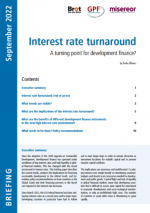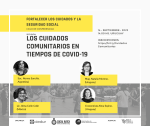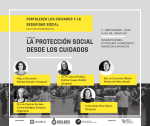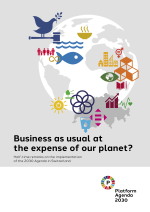Social Watch news
Published on Thu, 2022-09-15 19:54
Since the adoption of the 2030 Agenda on Sustainable Development, development finance has operated under conditions of low interest rates and high liquidity in global financial markets. This has changed with the recent turnaround in interest rates. The briefing paper Interest rate turnaround. A turning point for development finance? by Bodo Ellmers, describes the current trends, analyzes the implications for financing sustainable development in the Global South, and formulates policy recommendations on how countries in the Global South and their financing partners in the North can respond to the interest rate increases. |
Published on Wed, 2022-09-14 00:00
CONTRIBUTIONS TO THE DISCUSSION ON SOCIAL PROTECTION IN SOUTH AMERICA The second videoconference will be “Los cuidados comunitarios en tiempos de COVID-19” on Wednesday, September 14, 2022 at 2:00 p.m. of Argentina / Brazil / Uruguay, confirm your local time here. Speakers: Soc. Norma Sanchís (Argentina), Mag. Natalia Moreno (Colombia) y Lic. Alma Colin Colin (México). Moderation will be in charge of Alma Espino (Uruguay). |
Published on Thu, 2022-09-08 15:23
Since the 2012 United Nations Conference on Sustainable Development (Rio+20), the United Nations has annually convened the High-level Political Forum (HLPF) under the auspices of the UN Economic and Social Council annually and at Summit level under the auspices of the General Assembly every four years. The HLPF is the main mechanism through which UN Member States assess global progress on meeting the Sustainable Development Goals (SDGs) set by the 2030 Agenda for Sustainable Development. Member States can present their country reports on achieving the Sustainable Development Goals through Voluntary National Reviews (VNRs). The main SDGs for review at the 2022 HLPF were SDG 4 on quality education, SDG 5 on gender equality, SDG 14 on life below water, SDG 15 on life on land, and SDG 17 on global partnerships, with an overall theme on how the COVID-19 pandemic has impacted development progress. |
Published on Thu, 2022-09-08 00:00
With the aim of strengthening the political incidence of civil society in favor of social protection in South America, it is proposed a cycle of conferences with the participation of various organizations of civil society (e.g. feminists, trade unions, ecumenical, etc.) and experts in the field. Within the framework of the general issues of social security, with new proposals, such as minimum social protection, and from a consistent perspective of ensuring the sustainability of life, it is arises an innovative approach. For that it is necessary an official care policy which contemplate supports and complements care work and defends the recognition of the "right to care", gender equality and human development. Likewise, ways of financing social protection are explored, including the creation of a global fund. The first videoconference will be “Social protection from care” on Wednesday, September 7, 2022 at 2:00 p.m. of Argentina / Brazil / Uruguay, confirm your local time here. |
Published on Sun, 2022-09-04 17:46
Concept Note and Program The COVID 19 pandemic revealed the vulnerabilities of our societies in health terms, such as the lack of protection mechanisms so that the population could face the economic and social crisis that the pandemic brought about. In 2020, 53.1% of the world population didn’t have any type of social protection coverage. Specifically in the Americas, coverage exceeded the world average, reaching 64.3%. However, this figure varies according to the type of social protection considered. For example, in the Americas, only 16.4% of unemployed people had at least one benefit (ILO, 2022). |
Published on Wed, 2022-08-03 18:55
The covid-19 pandemic has increased poverty and inequality in the country and has laid bare the weaknesses of the public health and social protection systems, educational systems as well as provision of livelihoods and employment to Filipinos. This has led to catastrophic consequences for workers and their families, the majority of whom are in the informal sector and many of whom are women. Yet, two years since the onset of the Covid-19 pandemic, there has been no fundamental change in the government’s developmental strategy to address these systemic weaknesses and prioritize the care programs and services that our people need. Emerging from what seems to be the worst period of the Covid-19 pandemic, the country is slowly returning to some semblance of ‘normalcy’ (or what is also referred to as ‘the new normal’). |
Published on Fri, 2022-07-29 17:01
This year's report of the Social Watch for the Czech Republic focuses on three areas: the economy, health and care and socio-economic transformation. The report responds to the ramifications of the Covid-19 pandemic, but it also reflects on issues related to the conflict in Ukraine, in particular the impact of rising energy prices and inflation. In the report, economist Ilona Švihlíková criticises the absence of national economic policy and chaotic conduct of the governments (there was a change in administrations after last year’s October elections) throughout the pandemic, as well as its unsystematic and antisocial tax policy. |
Published on Thu, 2022-07-28 17:53
Switzerland is not on course for a sustainable world. That’s the verdict from Platform Agenda 2030 in its new report “Business as usual at the expense of our planet? Half-time remarks on the implementation of the 2030 Agenda in Switzerland”. It is calling upon the Federal Council to show more leadership in the transformation needed to halve poverty, protect the climate and human rights, and hold the financial sector to account. |
Published on Wed, 2022-07-27 22:15
This GPW Round Up #2, Ensuring Social Protection for All, highlights the critical importance of universal social protection not only in recovering from the pandemic, but also its vital role to address pre-existing deep-seated inequalities between and within countries. It details gaps in social protection coverage and financing, especially in poor countries, and failures of the targeted, or means-tested approach, often promoted by IMF and World Bank. |
Published on Wed, 2022-07-20 15:05
In This Issue African countries express concerns on damaging effects of IFFs CSOs question many proposals in the S-G’s flagship report - Our Common Agenda - and its central concept of networked multilateralism. |
SUSCRIBE TO OUR NEWSLETTER










